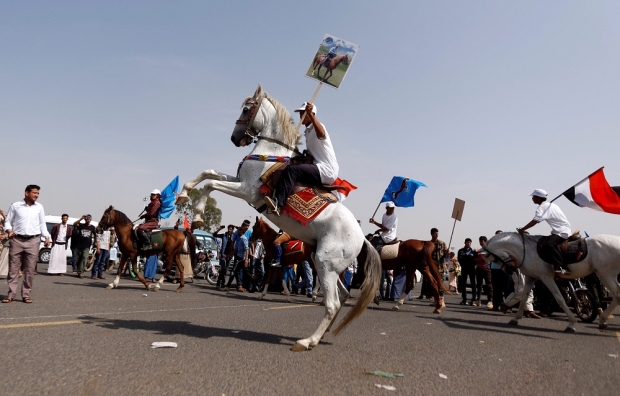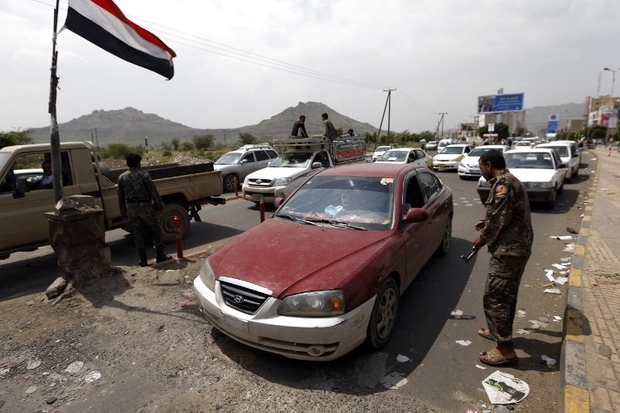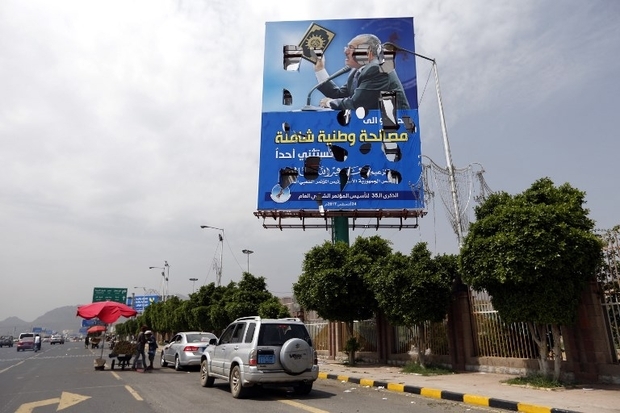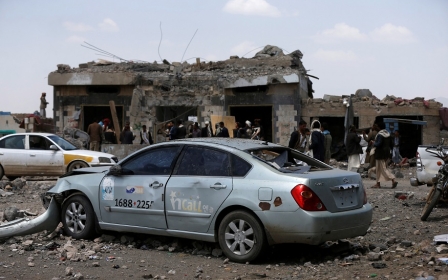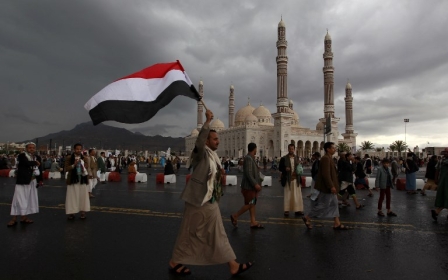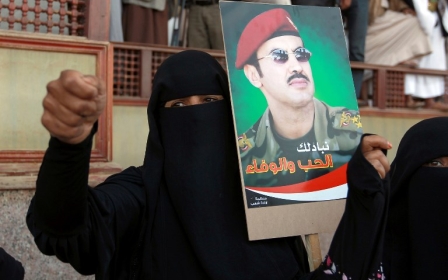'Saleh the traitor': Houthi-GPC schism spills onto streets of Yemen capital
SANAA - Yemen's capital was heading towards confrontation on Thursday as supporters of the Houthis and former president Ali Abdullah Saleh prepared to hold competing rallies on the back of an escalating war of words between the two supposed allies.
Thousands of Saleh supporters are expected to mass around al-Sabeen Street on Thursday to celebrate the 35th anniversary of his General People's Congress (GPC) party, while the Houthis have set up their own rallies around the city and at its main entry points, in what Saleh supporters say is an attempt to block access.
The rallies threaten to bring to a head the growing schism between the two movements, which has in the past few days led to the Houthis calling Saleh, their ostensible ally against the Saudi-led coalition, a traitor to their cause who "crossed a red line" in calling their forces "militias".
"We have been stabbed in the back and called a militia, which is treason in its purest form," read the Houthi statement on Wednesday.
"What he said crosses the red line ... and he will have to bear the consequences of his words."
Saleh's statements last week also criticised the Houthis for failing to run state institutions and pay workers, effectively blaming them for causing near-famine in the country. The Houthis blame the Saudi blockade of the country for the majority of its problems.
The dispute threatens a new, dangerous aspect of an already vicious war in Yemen that has pitted Houthis alongside supporters of Saleh against loyalists of Abd Rabbuh Mansour Hadi, the president who is backed by a Sauid-led coalition that includes the UAE.
Millions in the country now face starvation and disease and more than 10,000 have been killed since 2015.
On the streets of Sanaa
Posters of Saleh, put up in preparation for the marches, were torn down on Wednesday around Sanaa amid rumours, as yet unfounded, of clashes between loyalists of both movements.
Nouradeen Shoie, a Saleh supporter, said the ex-president needs his loyalty in this time more than any other.
"All of us know about the disputes between the leader Saleh and the Houthis. We should support the leader and tell the world that Saleh has supporters in all provinces," he said.
Shoie, a teacher who has not been paid in 10 months, said he had arrived early in Sanaa amid rumours the Houthis would block the roads leading in.
"We do not want Saleh and the Houthis to fight, as both are loyal to Yemen, but also we do not want to see the leader Saleh as a follower," he said.
"Before the so-called Arab Spring in 2011, everything was well. After that we started to suffer. I support Ali Saleh and hope to see his son, Ahmed, as our the next president.
Wadhah Abdullah, a Houthi supporter who will march tomorrow, said Saleh was going to betray them and the alliance with GPC would soon end.
"Saleh wants to use the Houthis to achieve his personal aims, but we are aware enough and we will not support him any more," he told MEE.
He said the Houthis did not want to create disputes with Saleh, but he had brought the situation upon himself.
From unease to hostility
The alliance between the Houthis and Saleh supporters has always been shaky, and the groups fought several wars during Saleh's time as president.
But unease crystalised into outright hostility in the past week, amid rumours the Saudis and the UAE were attempting to turn Saleh's head and offer a way back to power for his party and family.
It began at the weekend when Saleh criticised the Houthis' running of the country. Abdul Malik al-Houthi, the Houthi leader, hit back on Saturday, stating his movement ran "less than one percent of the general administrative structure of the country".
"It is unfair to hear some people from GPC and other sides ask Ansar Allah [the Houthi movement] about the salaries and other issues. Where are you [GPC]? You are a partner of responsibility and have representatives more than Ansar Allah. We are against political extortion."
A day later, Saleh accused the Houthi's revolutionary committees of taking over the country's institutions, and expressed a willingness to break away from their alliance.
"The fact is the revolutionary committees control the Supreme Political Council and the revolutionary committee cancels any decisions which are not welcome.
"If you want to return to power alone, we will withdraw but without disputes."
Schism spills on to streets
Saleh accused the Houthis of preparing protests in the main entrances of the capital to hamper GPC supporters coming in from outside.
"I call Ansar Allah to participate in al-Sabeen celebration and work as one front to face the aggression. The tension on the ground does not serve the alliance against the aggression, rather than it serves the aggression."
The head of the Houthis' revolutionary committees, Mohammed Ali al-Houthi, called on his supporters to protest at the entrances to Sanaa to send support of fighters and food to the fronts.
"I call on the revolutionaries to protest on Thursday in the squares to send support of fighters and food to the fronts, as there will be protests in al-Sobaha, Sanhan, Bani al-Harith, Hamdan and other provinces," Houthi said on Facebook on 18 August.
Ibrahim al-Siragi, a journalist based in Sanaa, said the disputes run deeper than ever before and were rooted in disagreements over finding a political solution to the Yemen war.
The art of the deal
But he said both sides would carefully consider how they move forward. "Thursday's protests will be the starting point, but there will not be fighting - neither side believes that would be in their interests," Siragi said.
"I think that Saleh is in contact with the UAE, and the UAE has started to persuade Mohammed bin Salman [the Saudi crown prince] about reconciliation with Saleh. That is why Saleh is going for a political solution."
An apparent disagreement ... may represent an opportunity to break the deadlock created by Houthi intransigence
- Anwar Gargash, UAE foreign minister
The UAE's foreign minister, Anwar Gargash, said via Twitter on Monday: "The political path remains the basis of any solution in the Yemeni crisis, an agreement that brings together Yemenis, prevents Iranian intervention, and addresses the issues of terrorism, the future of the south and the nature of the government.
"Saleh's last speech shows an apparent disagreement with the Houthi partner, and it remains that it may represent an opportunity to break the political deadlock created by Houthi intransigence."
Siragi said that Saleh supporters in al-Sabeen street had not prepared posters criticising the Saudi coalition, and that marchers would not shout anti-Saudi slogans as they had done in the past.
"Ali Saleh has already decided to choose the political solution," he said. "During the last two years, Ansar Allah was leading the country while Saleh was only a follower, but now Saleh wants to be in the lead."
Middle East Eye delivers independent and unrivalled coverage and analysis of the Middle East, North Africa and beyond. To learn more about republishing this content and the associated fees, please fill out this form. More about MEE can be found here.


